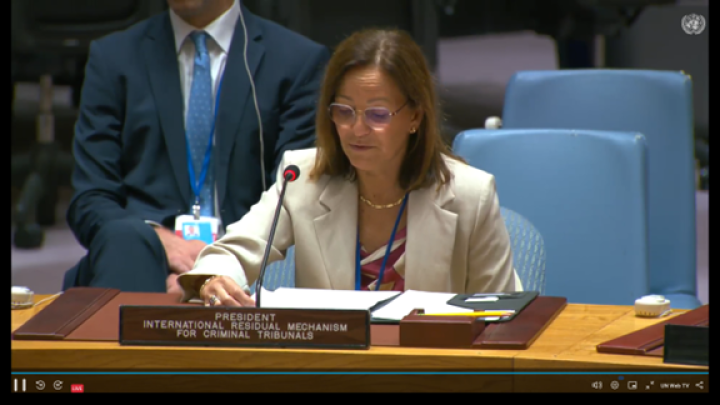President Gatti Santana presents the Mechanism’s progress of work to the United Nations Security Council

The President of the International Residual Mechanism for Criminal Tribunals (Mechanism), Judge Graciela Gatti Santana, today presented the Mechanism’s twenty-fourth progress report, as well as its fifth review report, to the United Nations Security Council (Council) in New York.
President Gatti Santana began her address by expressing deep gratitude for the Council’s enduring support to the Mechanism and noting that this year marks Kwibuka30, the 30th Commemoration of the 1994 Genocide Against the Tutsi in Rwanda. She observed that this solemn act of remembrance not only brings focus to the 100 days of horror that beset Rwanda, but also reveals that the seeds of ethnic division that grew into genocidal violence had been sown long before.
In this context, President Gatti Santana remarked that the justice cycle needed to confront the resulting atrocities is likewise long and requires sustained support. She reiterated that justice does not end with the delivery of a final judgement, and that the Mechanism’s remaining functions demand the same diligence, humanity, and fairness as trials and appeals, to ensure the credibility of the judicial process set in motion by the Council when it established the ad hoc Tribunals.
The President assured the Council that, following its transition to a truly residual institution, the Mechanism is “steadily advancing on the path of completion”. After explaining the Mechanism’s future planning activities and efforts to reduce its organizational footprint and streamline its operations, she spoke of the important work the Mechanism still has to do, which is “substantial and unprecedented among international and internationalized tribunals” and requires sufficient resources.
President Gatti Santana drew the Council’s attention to the enforcement of sentences, highlighting that a total of 48 convicted persons are presently under the Mechanism’s supervision. In addition, the Mechanism remains tasked with managing, preserving, and facilitating access to its archives and those of the ad hoc Tribunals; a function closely connected with the President’s priority to consolidate the rich legacy of these institutions, which can serve as a powerful resource for combatting denial and revisionism. Related to this, she noted that the Mechanism continues to receive and adjudicate requests to access confidential evidence and to vary witness protective measures, which are vital for the pursuit of accountability at local levels.
With respect to other residual functions, the President reported on the Appeals Chamber’s recent authorization of limited review proceedings in the Gérard Ntakirutimana case. She further explained that, while the Mechanism retains jurisdiction over conduct that interferes with its administration of justice and for false testimony, it is mindful of the statutory obligation to consider the referral of such cases to national jurisdictions before proceeding to trial, as evidenced by the referral of the Šešelj et al. contempt case and the pending consideration by a Single Judge of whether to refer the François Ngirabatware contempt case.
Turning to the critical role played by States, President Gatti Santana emphasized that the Mechanism’s ability to fulfil its residual functions remains dependent on State cooperation, and that sustained support is essential to guarantee the efficient functioning of the justice process and the credibility of international justice as a whole. As an example of successful efforts in this area, the President mentioned the Prosecutor’s recent announcement that all fugitives indicted by the International Criminal Tribunal for Rwanda have now been accounted for. On the other hand, the Mechanism continues to face challenges, including the ongoing refusal of Serbia to cooperate in the Jojić and Radeta contempt case, and the impasse in the situation of the acquitted or released persons relocated to Niger.
In closing, President Gatti Santana affirmed that, with the Council’s support, the Mechanism “will deliver on the promise made in this very hall that impunity will not prevail” and that, as the embodiment of the Council’s commitment to justice, the Mechanism “stands ready to continue that pursuit to its conclusion”.